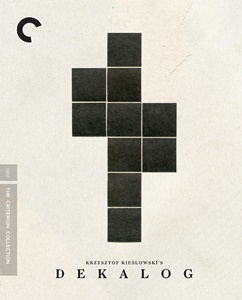One of the standout episodes of ‘Dekalog’, the sixth film explores love and sex through a voyeuristic setup, but not without a potent sense of emotion and human connection.
Dir. Krzysztof Kieslowski
1988 | Poland/West Germany | Drama | 60 mins | 1.33:1 | Polish
Not rated (likely to be PG13 for some sexual references)
Cast: Olaf Lubaszenko, Grazyna Szapolowska, Piotr Machalica
Plot: A teenage poster worker, Tomek, routinely spies on his older neighbour Magda, a sexually liberated artist who lives in the apartment across the courtyard from his. As their private worlds merge, fascination turns to obsession, and the line between love and curiousity becomes violently blurred. (from The Criterion Collection)
Awards: Won FIPRESCI Prize & Children and Cinema Award (Venice). Official Selection (Cannes).
Source: Telewizja Polska S.A.
Accessibility Index
Subject Matter: Moderate
Narrative Style: Slightly Complex
Pace: Slightly Slow
Audience Type: Slightly Arthouse

(Reviewed on Criterion Blu-ray – first published 23 Apr 2017)
Reviews:
Dekalog: One
Dekalog: Two
Dekalog: Three
Dekalog: Four
Dekalog: Five
Dekalog: Seven
Dekalog: Eight
Dekalog: Nine
Dekalog: Ten
Spoilers: Mild
Content-wise, there’s nothing remotely adulterous about the sixth episode of Dekalog, but as the sin of adultery almost always revolves around the intertwining nature of love and lust, the film loosely suggests that humans are vulnerable beings in need of connecting with someone.
This notion is dramatized in the affecting story of a young man, Tomek (Olaf Lubaszenko), who spies on an older woman, Magda (Grazyna Szapolowska), who lives opposite his block.
Through a voyeuristic setup that immediately calls to mind Hitchcock’s Rear Window (1954), Kieslowski’s film explores love, passion and sex with a potent sense of emotion and human connection. This is, without a doubt, one of the finest episodes of the series.
Thou shalt not commit adultery.
Tomek doesn’t hide his stalking actions from Magda, and the duo forms an unlikely if awkward relationship. Magda, the more cynical party, shuns the idea of love, declaring it impossible and unattainable—for her, sex is the consolatory substitute for love, of which she actively engages with a male partner (of similar age), whose relationship with her is unclear.
Tomek, on the other hand, is attracted to Magda, but is he naïve to think that love is as what he feels? One might read Dekalog: Six as Tomek’s coming-of-age tale, where he finds sexual awakening, but also confusion and frustration toward his own feelings.
What makes the film intriguing is how the tables are turned in the final twenty minutes or so, adding thematic and emotional complexity to the proceedings.
Tomek slits his wrist after an upsetting encounter with Magda, an act of rashness that sends him to the hospital. In the absence of Tomek, Magda cuts a desolate figure, plagued by guilt. She spies on Tomek’s apartment, hoping to find him back home, perhaps spying on her again.
The final scene, which I’ll leave you to savour, is one of the truly standout moments of the series, imbued with a nuanced touch of Kieslowskian ambiguity that suggests either reconciliation or indifference towards the future of their relationship.
Whichever way you read it, the constant is that both characters have grown through the course of the narrative. But are they none the wiser about love?
Grade: A
Trailer:
Music:












[…] Dekalog: One Dekalog: Two Dekalog: Three Dekalog: Four Dekalog: Five Dekalog: Six Dekalog: Seven Dekalog: Eight Dekalog: […]
LikeLike
[…] Dekalog: One Dekalog: Two Dekalog: Three Dekalog: Four Dekalog: Five Dekalog: Six Dekalog: Seven Dekalog: Eight Dekalog: […]
LikeLike
[…] Dekalog: One Dekalog: Two Dekalog: Three Dekalog: Four Dekalog: Five Dekalog: Six Dekalog: Seven Dekalog: Nine Dekalog: […]
LikeLike
[…] Dekalog: One Dekalog: Two Dekalog: Three Dekalog: Four Dekalog: Five Dekalog: Six Dekalog: Eight Dekalog: Nine Dekalog: […]
LikeLike
[…] Dekalog: One Dekalog: Two Dekalog: Three Dekalog: Four Dekalog: Six Dekalog: Seven Dekalog: Eight Dekalog: Nine Dekalog: […]
LikeLike
[…] Dekalog: One Dekalog: Two Dekalog: Three Dekalog: Five Dekalog: Six Dekalog: Seven Dekalog: Eight Dekalog: Nine Dekalog: […]
LikeLike
[…] Dekalog: One Dekalog: Two Dekalog: Four Dekalog: Five Dekalog: Six Dekalog: Seven Dekalog: Eight Dekalog: Nine Dekalog: […]
LikeLike
[…] Dekalog: One Dekalog: Two Dekalog: Three Dekalog: Four Dekalog: Six Dekalog: Seven Dekalog: Eight Dekalog: Nine Dekalog: […]
LikeLike
[…] Dekalog: One Dekalog: Two Dekalog: Three Dekalog: Four Dekalog: Five Dekalog: Six Dekalog: Seven Dekalog: Eight Dekalog: […]
LikeLike